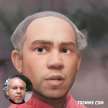The Banks of the Rubicon
A short story about Julius Caesar conquering Gaul, and executing Vercingetorix for triumph.

Julius Caesar is probably the most famous leader in history. He is famous for such innovations as the Appian Way, the Modern Calendar, and Seigeworx. His most notable act, the conquering of Gaul and England, yielded the most noted battle in history. It ended when Caesar was compelled to chase down his comrade, Pompeii, to Egypt; and Cassius to the Mediterranean Gulf; and kill or force them to commit suicide. The Battle of Alesia is highly regarded for the technical superiority used when Caesar captured the Gallic Chieftain Vercingetorix (pronounced: Ver-sin-GET-or-ix). Julius Caesar marched his armies from Rome on the central west coast of what we now call Italy, across the Roman Alps (the frozen barrier of mountains separating the Italian Peninsula from Germany) into Europe to hunt for the barbarians who were raiding the Tuscan farming villages that supplied Rome with grain and meat. The first obstacle that Caesar and his army met was the Rhine River. There Caesar had his men construct a wooden bridge from the surrounding trees. They crossed and disassembled the pontoon flotilla bridge with the last men across each section as to take it with them.
They then began to conquest through the vastly outnumbered tribes of Gaul, which was an ancient country that spread from modern Portugal to Poland, the entire continent of Europe. His intelligence officers heard a rumor about a chieftain named Vercingetorix. Their job was to track the most cunning chieftain that Gaul's tribesmen had to offer. Their algorithm ruled out the weaker, and found Vercingetorix. They chased him to a city that is northwest of what is now Dijon, France known as Alesia (or Alize Ste. Rheine).

There, the armies of Caesar surrounded the city with walls, trenches, spikes, and Seigeworx (Archer towers, ballista, trebuchet {named for the region in which Caesar developed the weapon}, and catapults). But some of Vercingetorix’s men escaped to get reinforcements, so he had his men construct another series of walls, trenches, spikes, and seigeworx around themselves. The waiting game began.
Caesar's army would be outnumbered and outflanked when all the Gallic tribes converged on him. With his bravado intact, he began to think. This response was in direct relation to the days of his youth when, as a soldier, he won decisive battles against Greece (one of the reasons Caesar made the Calendar have a code in it naming a Greek Hero). His bravado made his tail swag, so he rode a horse. He then had his Horsemen and Chariots carry archers around a track inside the walls he had built. The skilled marksmen whittled down the Gauls until the infantry could drive the reinforcements off of the hill, while his infantry teamed the Seigeworx at Vercingetorix and his men on the inside.
Caesar's men sacked the city as well. Alesia and her people wouldn't make it out of this one. It was Caesar's army's property and would meet the same fate as the rest of Gaul. This time, the purpose was to collect martyrs (Vercingetorix and his perceived inner circle) and slaves (his family). He had them chained, with cages made for the martyrs. He was then told of a series of islands, Saxons and Vikings. The British Isles and Nordic territories were said to be rich and bountiful, so he marched his armies, captured slaves, and martyrs to the coast. There, he had his men construct boats to sail across the English Channel to the islands. They set sail on the choppy waters straight to a set of rocky cliffs on the south of Great Britain. The monarch of the Saxons was a wise queen. Her spies saw the massive fleet of ships and gathered her and her armies on a flat piece of coastal land to wait for the larger army to land. When Caesar came to shore, she immediately surrendered making Caesar the first man in History to conquer Europe. He took no prisoners from the islands, yet he left a couple of armies to look after the interests of Rome. They turned around and set sail back to the European mainland. He opted not to go to the Viking lands because intelligence officers found that they were a strong and formidable foe, and with his armies thinned from the earlier battles he thought it better to get back to Rome. They marched back across Europe, crossed the Rhine river, and the Alpine mountains into Tuscany and on to Rome.

He stopped at a river outside Rome called the Rubicon. This place was where he spent his childhood playing, swimming, and fishing. He had fond memories of this majestic river, and a sense of nostalgia caused him to camp on the banks of the river that nights, as in the morning he was to face Triumph, and the Roman Senate headed by his close friends, Pompeii and Cassius, and his enemy, Cicero, a scribe from a wealthy family of Rome. In this pause, he thought of his childhood, how long he had been away from Rome (2 years), and of the reported turmoil that Cicero’s speeches laced with paranoia had laid upon Rome. He spoke with Vercingetorix to tell him he was to die for Caesar's honor.
Caesar pulled open the door to the carriage holding Vercingetorix, who sat there like a stone staring at the beast that held him hostage, sizing him up while planning an escape that would not get to spring him.
"Do you know why I want to talk to you?" Caesar barked. Vercingetorix said nothing. He merely stared at him with his eyes about to explode from the calculations in his brain.
"I am here to tell you that you are going to die tomorrow. You, and your family, will be pulled from these carriages at the gates over there. They are to my city, of Rome. My men will whip and beat you all as you walk to the Senate Piazza. There I will tell the crowd of the victorious expedition that my army has undertaken to rid the world of the barbarians that attacked Rome."
Vercingetorix interrupted pleading to Caesar, "It was not my people, we do not live in the Alps. There is a tribe there, I can show you. Let's go back, they are not us."
"It doesn't matter. I only wanted to prove to your people that we are not to be taken as food or bounty for their demonic ways," Caesar started in a matter-of-fact tone, but once again Vercingetorix interrupted.
"I beg of you they are not us," he cried.
"Silence! You are only going to be sent to them as a message. You are nothing. No longer a king, a sacrifice. A gift to my people to prove their safety. It would be futile for you to pursue this further. You have been weighed and measured, and tomorrow you will make it to the piazza. There your throat will be sliced from ear to ear and YOUR blood will fill my bowl! As will your family. Now make peace with your God, as you will meet him soon."
And Caesar left for his tent.

Then, he slept. That next morning, he woke, washed up, and then knelt by the river to gather himself before heading into Rome. Pompeii and Cassius, who had taken to cursing Caesar because of Cicero’s famous quote, “Yourself is the only one you can trust,” that divided the Roman people about the potential trouble of Caesar’s journey, took off afraid of the sheer size of Caesar’s army and his temper.
Pompeii went to Egypt, where Cleopatra's 14-year-old little brother, Ptolemy the 17th, beheaded the General in anticipation of Caesar’s arrival. Cassius headed to Persia, where he committed suicide to save the lives of his family and armies from Caesar’s wrath. As Caesar would enter the city there would be no other armies or Generals, only citizens, slaves, and Senators. He had his men open the gates, and he rode in first, followed by the (Vercingetorix and his inner circle), then the slaves he had captured, and then his men. He then stopped at a Piazza (plaza) outside of the forum where the senate met. His guards dragged the martyrs onto the stage and placed them behind a table with a big bowl on it. Caesar then walked onto the stage to do the Roman end of War ritual known as Triumph. He pulled his sword out and motioned for his guards to bring the martyrs forward one by one. He slit their throats and let their blood drip into the bowl, saving Vercingetorix for last. As he placed the knife to his neck, he spoke, “With you, your people die.”

Caesar then slit his throat, threw him to the side, and dipped his hands into the blood so that he could smear it on his face. The crowd that had gathered erupted in cheers as Caesar began to walk the streets of Rome as a conqueror of men, proud and tall. Cicero, stayed at the back of the crowd possibly plotting his assassination that would come upon Caesar’s return from chasing Pompeii and Cassius. The continent and soon the rest of the known world would be (though short-lived) under one man’s control, and Caesar relished every minute of it.

About the Creator
Jake Davis
Writer, Coder, Trader, Newspaper owner.






Comments
There are no comments for this story
Be the first to respond and start the conversation.